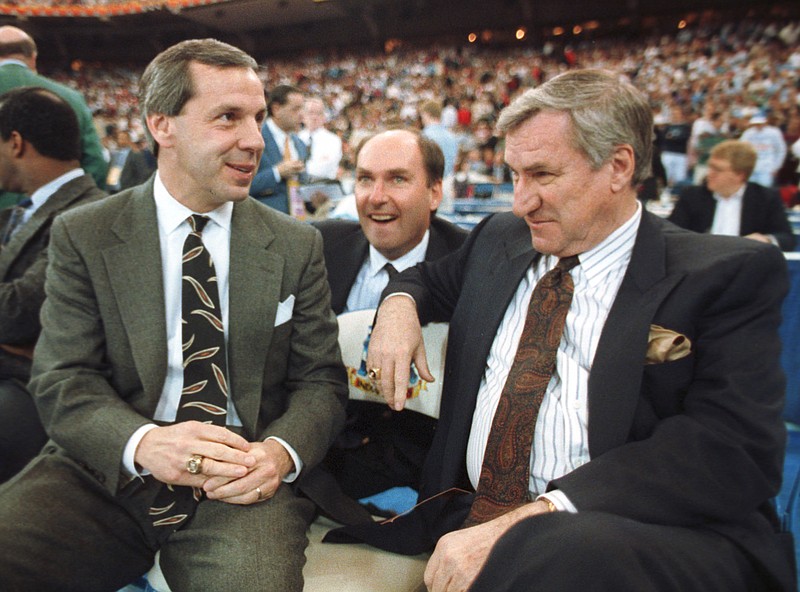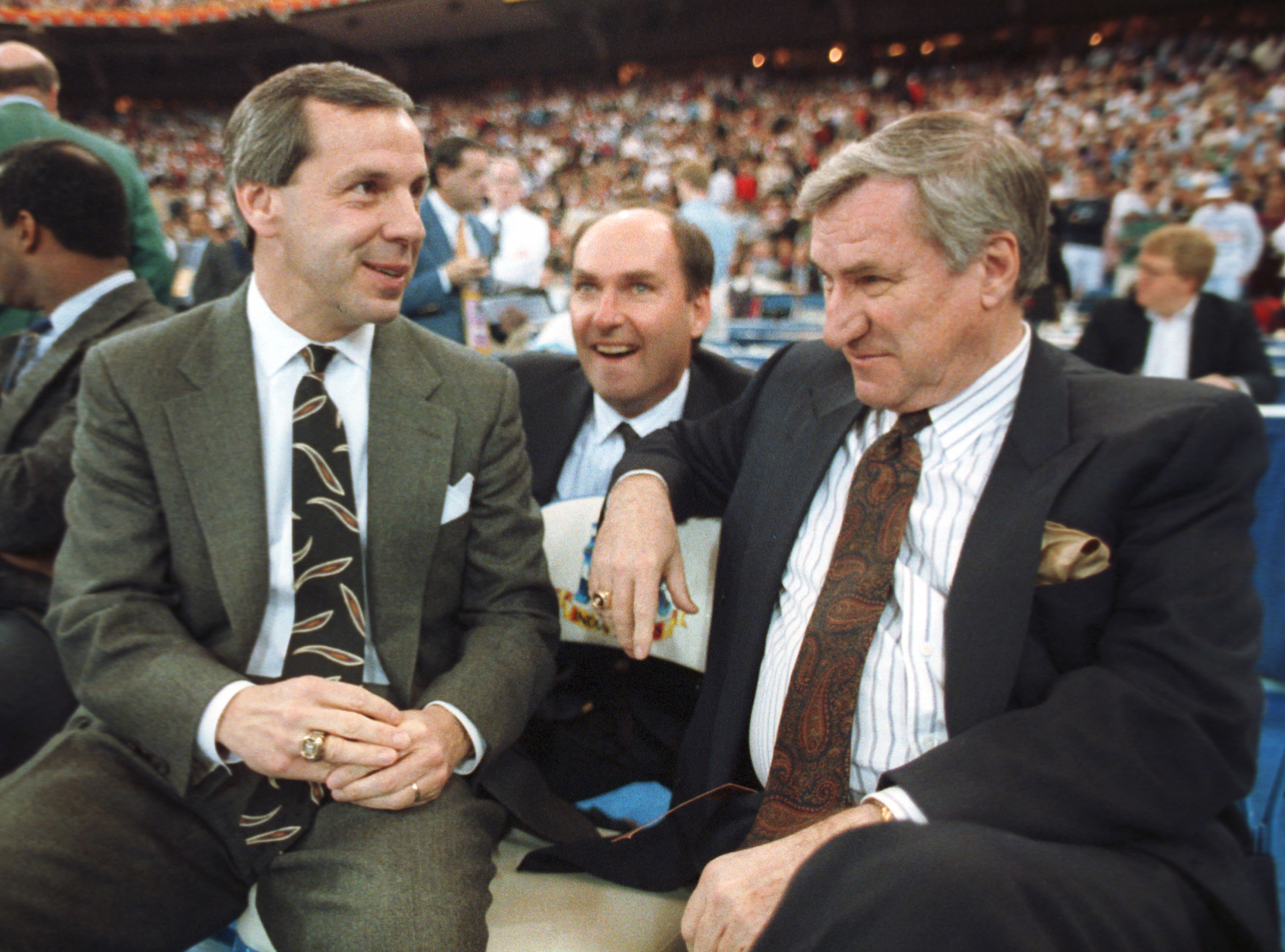And because he'd been a lifelong friend of North Carolina basketball coach Dean Smith's son Scott, Wamp pursued an endorsement from the UNC coach, even though Wamp was a Republican and Smith a well-known Democrat.
"A couple of weeks later I got this letter on Coach Smith's stationary," Wamp said on Sunday, less than 24 hours after the 83-year-old Smith passed away, his death preceded by a lengthy struggle with dementia.
"I was so excited. Then I started reading it. He wrote, 'Zach, even though I have the upmost respect for you, I'm what's known as a yellow-dog Democrat, and I will never, ever endorse a Republican.' That was Coach Smith. He had his values and beliefs and they weren't changing for anyone.'"
The stories poured forth from all corners of the country on Sunday, all of them trumpeting the beliefs and values and character of the humble man with Kansas roots they all reverently referred to as Coach Smith.
Some of it was about the basketball, of course. About his genius with Xs and Os. About his offensive and defensive innovations, such as his annoying four-corners offense that led to the 35-second shot clock. Just as many recalled his nods to sportsmanship and camaraderie, everything from pointing to a teammate after each assist he delivered you, to the whole squad standing up each time a teammate returned to the bench, to raising your hand to take yourself out when you needed a breather.
"The most innovative mind ever," ESPN analyst Dick Vitale noted Sunday. "To me a sign in life, a sign of greatness, is when you can affect generation after generation of people by the impact you've made while here. That's exactly what he's done. That's why he was the Michelangelo of coaching - an artist at work."
And the basketball was amazing. A stunning 879 wins, which was the most in the history of college basketball when he retired in 1997. Two national championships. Eleven Final Fours. Winning gold in the 1976 Olympic Games.
But the 96 percent graduation rate was perhaps more impressive. So, too, Smith's lifelong passion to achieve racial equality in the South. He signed the first African-American to play in the Atlantic Coast Conference when he inked Charles Scott in the mid-1960s. He once integrated a North Carolina restaurant by entering with a black student and a pastor while he was still a UNC assistant. Talk about values and beliefs and guts.
"Here's a story about Coach Smith's rules," said Jimmy Braddock, the former Baylor School great who became a key reserve on Smith's first national championship team in 1982.
"He had a rule that anyone who visited our practices had to sit behind this rail in what amounted to an upper level in Carmichael (UNC's old gym before the Dean Smith Center opened in 1986). That way, you could see what we were doing but you couldn't hear what Coach was saying. Anyway, one day we're in there and this older couple sits one row in front of the rail. Coach Smith asks a manager why they're there. The manager finally says, 'Coach, those are your parents.' So what does Coach do? He goes up there and makes them sit behind the rail. The rules applied to everybody. All the time."
There were even times when Smith would impose a rule with no warning.
"I'd just turned 16," Wamp recalled. "And I was going to go to Coach Smith's summer basketball camp. My parents decided to let me drive over there. So here I am, a 16-year-old away from home with my own car. What could be better? But when I get to Chapel Hill, Coach Smith was there to meet me. He told me to hand him the car keys, that I could get them back on my way out of town. He probably just didn't want a kid who'd just got his driver's license driving Scott around, or maybe my parents called him, but I didn't get the keys back until I was ready to go home."
Smith grew so close to the Wamps that when he came one year to visit Scott, who was a McCallie School boarder, he had dinner with Zach's parents. Upon telling Donald Wamp, an award-winning architect, that he'd always wanted to design his own house, Wamp went to the basement, got out some drafting paper and worked with the coach until he'd sketched out his dream house.
"And that was the house Coach Smith eventually built," Zach said.
The figurative house Smith built rose from rock-solid principles that everyone he touched still uses today.
"The first time I met him, when he came to my house to recruit me, I was immediately touched by how honest he was, how much integrity he had," said Braddock. "And that first impression always remained true. His honesty, integrity and work ethic have influenced me every day of my life."
Former UNC coach and player Matt Doherty - a teammate of Braddock's - recalled that honesty in an ESPN interview on Sunday.
"Like so many of us back then, I was a McDonald's All-American," Doherty said. "One day I wore my McDonald's jersey into the basketball office. Coach Smith looked at me and said, 'Matthew - because my parents always called me Matthew - you might want to think about giving that to your (younger) brother John."
Told that story, Braddock laughed.
"There were a lot of us," he said, "walking around with T-shirts back then that could have said, 'I Eat Humble Pie.' Coach Smith could definitely put you in your place."
McCallie School and former University of Tennessee at Chattanooga coach John Shulman was once an assistant for current East Carolina and former UTC and Auburn coach Jeff Lebo, one of Smith's finer guards.
"When we were at Tennessee Tech, Jeff sent me to one of Coach Smith's North Carolina coaching clinics, which usually included 20 guys with UNC ties, guys like Larry Brown, Mitch Kupchak, Roy Williams, Eddie Fogler - the best of the best. So I get a seat in the back of room with all these legends and try to be as inconspicuous as possible.
"After the second day Coach Smith comes up to me and says, 'John, you've been really quiet back there.' I said, 'That's my job. I was just want to learn as much as I can.' He said, 'That's probably a good idea.'"
Now fast-forward four years. Shulman hadn't been anywhere near Smith since that first clinic. But they were both at a different clinic in Birmingham. The Mocs had just gone to the NCAA Tournament in Shulman's first year as head coach. Out of the blue, Smith approached. "John," he said, "congratulations on a great year."
Said Shulman, "He had the most incredible memory. I think that's one thing that makes this so sad."
Death is almost always sad, even when, as Doherty noted early Sunday, "He's in a better place. He was existing, but he really wasn't living. It's sad, but now we get to celebrate his magnificent life."
It was clearly a magnificent life built on so much more than basketball.
But Shulman also perfectly framed Smith's basketball legacy when he mentioned him in the same sentence as the late UCLA coach John Wooden, thought by many to be the greatest coach ever.
"For this half of the country," Shulman said, "Dean Smith was our John Wooden."
Contact Mark Wiedmer at mwiedmer@timesfreepress.com

